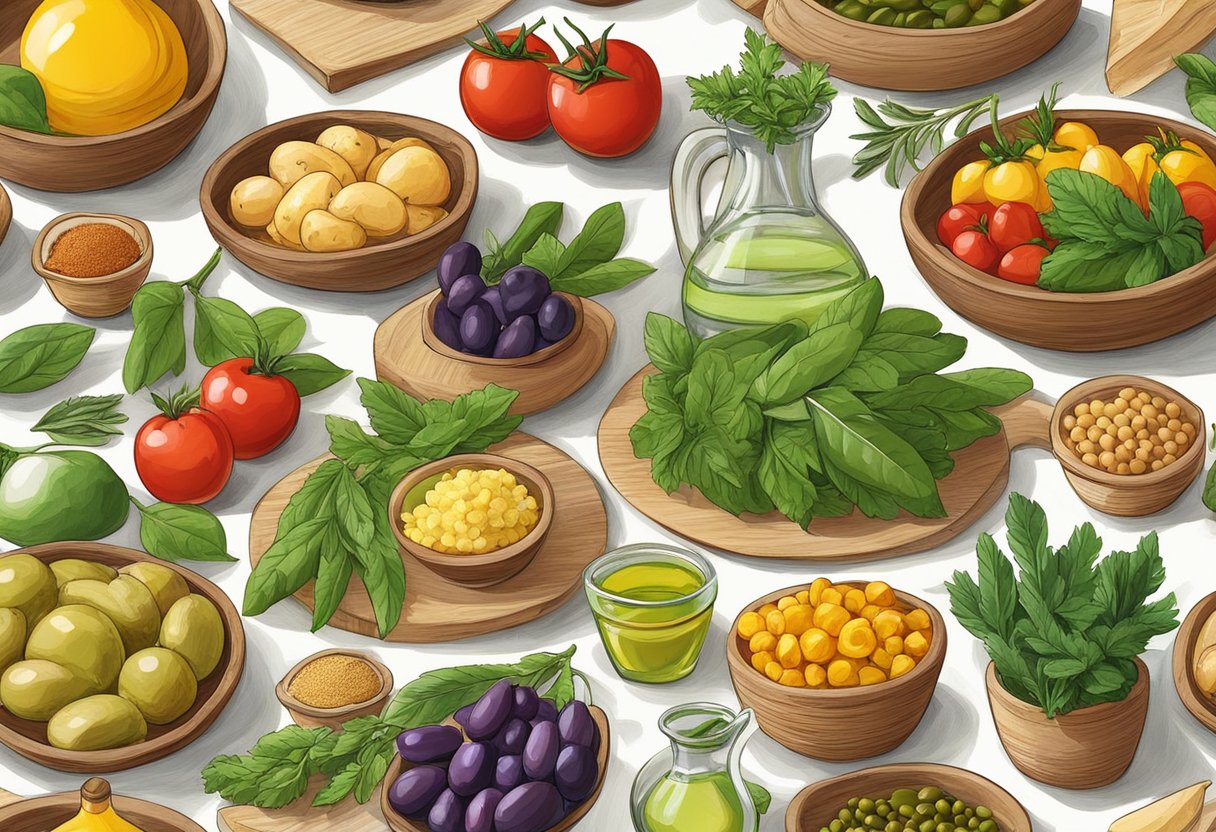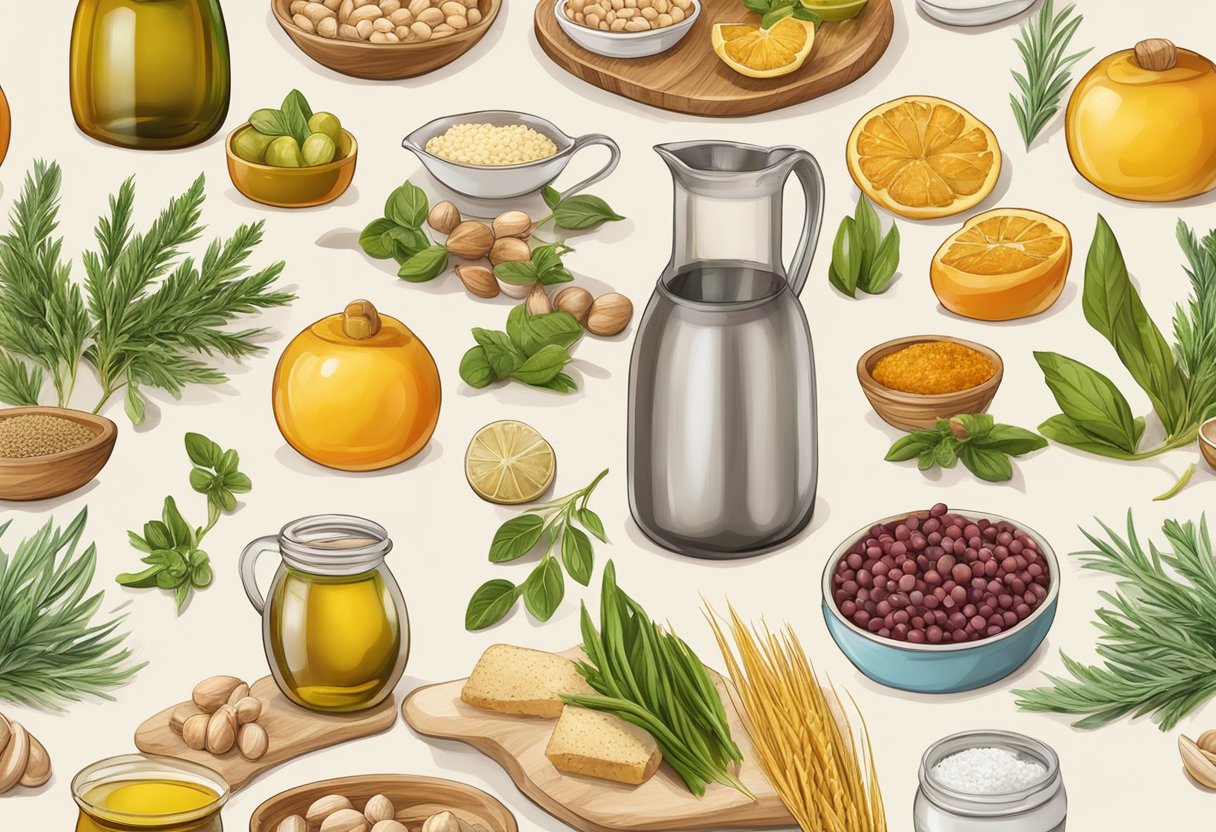The Mediterranean diet, lauded for its health benefits and rich flavors, emphasizes consumption of vegetables, fruits, whole grains, legumes, nuts, and lean proteins like fish. When adopted by those with celiac disease or gluten sensitivities, the gluten-free iteration of this diet requires careful selection of ingredients and cooking techniques to avoid gluten while still enjoying the diverse tastes of Mediterranean cuisine. By prioritizing naturally gluten-free foods that are staples in the region—such as quinoa, fresh produce, and seafood—individuals can maintain a balanced and nutritious diet without the worry of gluten-induced health effects.

Embracing the gluten-free Mediterranean diet involves more than simply replacing traditional wheat-based products with gluten-free alternatives; it entails a deeper understanding of how to bring out robust flavors through time-honored cooking methods. Techniques such as grilling, roasting, and sautéing can enhance the natural profiles of Mediterranean ingredients. The incorporation of aromatic herbs, citrus, and olive oil not only provides signature flavors characteristic of Mediterranean dishes but also ensures that the food aligns with gluten-free dietary restrictions.
Key Takeaways
- The gluten-free Mediterranean diet combines the health benefits of traditional Mediterranean foods with the needs of those avoiding gluten.
- Proper cooking methods and ingredient selection are crucial for creating flavorful gluten-free Mediterranean dishes.
- Utilizing herbs, citrus, and olive oil is key to achieving the authentic taste of the Mediterranean palate while adhering to a gluten-free diet.
Table of Contents
Understanding the Gluten-Free Mediterranean Diet

Embracing a gluten-free Mediterranean diet involves merging the heart-healthy principles of the Mediterranean lifestyle with a gluten-free approach essential for managing Celiac Disease and gluten sensitivity.
Principles of the Mediterranean Diet
The Mediterranean Diet emphasizes the consumption of vegetables, fruits, nuts, seeds, and olive oil alongside moderate amounts of dairy, fish, and poultry. It promotes whole grains and suggests a limited intake of red meats and sweets.
Gluten-Free Diet Basics
A gluten-free diet excludes all forms of wheat, barley, rye, and oats that are not labeled gluten-free. It’s crucial for those with Celiac Disease to avoid gluten as it triggers harmful immune responses.
Adapting Mediterranean Foods to Gluten-Free
Adapting traditional Mediterranean foods to a gluten-free diet involves substituting grains with gluten-free options like corn, rice, and gluten-free labeled oats. Using fresh, unprocessed foods is key.
Benefits of a Gluten-Free Mediterranean Diet
This diet combines the reduction of inflammation and risk of heart disease and cancer associated with the Mediterranean diet while managing Celiac Disease symptoms and gluten intolerance through a gluten-free lifestyle.
Navigating Diagnosis and Diet Transition
After a Celiac Disease diagnosis, work with a registered dietitian or nutritionist to adapt to a gluten-free Mediterranean diet. This transition should be gradual, replacing gluten-containing foods with gluten-free alternatives.
Reading Labels and Preventing Cross-Contamination
Carefully reading product labels identifies hidden gluten sources. Preventing cross-contamination involves dedicated kitchen spaces and utensils for gluten-free foods.
Creating a Gluten-Free Mediterranean Grocery List
Your grocery list should include:
- Fresh fruits and vegetables
- Gluten-free whole grains: rice, quinoa, and gluten-free pasta
- Nuts and seeds
- Olive oil
- Dairy products
- Protein: fish, chicken, and beans
Meal Planning and Preparation Strategies
Meal planning for a gluten-free Mediterranean diet involves prioritizing fresh produce and lean proteins, integrating gluten-free grains, and planning meals around seasonal foods to ensure a variety of nutrients.
Challenges and Tips for Staying on Track
Maintaining a gluten-free Mediterranean diet can be challenging due to dietary restrictions. Tips for staying on track include meal prepping, educating oneself about gluten-free substitutions, and connecting with support groups for ongoing advice and motivation.
Fundamental Cooking Techniques

The mastery of fundamental cooking techniques is crucial for those on a gluten-free Mediterranean diet. This knowledge ensures meals are both safe for individuals with Celiac disease and embody the flavorful essence of Mediterranean cuisine.
Safe Cooking to Avoid Gluten Exposure
Cross-contamination is a critical concern for individuals with Celiac disease. To avoid gluten exposure, one must:
- Use separate cookware dedicated for gluten-free cooking.
- Clean surfaces thoroughly before preparing gluten-free dishes.
- Consider using separate sponges and cleaning tools to prevent residue transfer.
Mediterranean Cooking Essentials
Mediterranean cooking hinges on the use of specific techniques that highlight the natural flavors and textures of the ingredients. Here are some essentials:
- Grilling: Perfect for vegetables, meats, and fish, grilling imparts a smoky flavor and helps retain nutrients.
- Sautéing: Utilizing olive oil, quickly cook vegetables or proteins at medium-high heat while retaining their crispiness and colors.
- Roasting: Slow roasting at lower temperatures can elevate the taste and texture of both meats and vegetables.
Healthy Fats Integration
The incorporation of healthy fats is a hallmark of the Mediterranean diet. When creating gluten-free dishes, consider the following:
- Olive oil: Heart-healthy and versatile, olive oil is a cornerstone in Mediterranean cooking, perfect for dressing salads, sautéing, and even baking.
- Nuts and seeds: These can be used to garnish or as a base for sauces, adding both texture and nutritional value.
- Avocado: A nutrient-dense fruit that offers a creamy texture and health benefits, it can be used in salads, spreads, and even smoothies.
Building Flavor with Mediterranean Ingredients

The Mediterranean diet emphasizes the use of fresh, wholesome ingredients to create flavorful dishes without the need for gluten-containing elements.
Using Spices and Herbs
The Mediterranean palate is known for its liberal use of spices and herbs. Rosemary and oregano are staples in these cuisines, bringing rich, earthy flavors to a variety of dishes. They can easily transform simple grilled meats or roasted vegetables into aromatic delicacies. Let’s not forget the power of garlic, which not only infuses dishes with its pungent flavor but also adds to the health benefits.
Leveraging Fresh Vegetables
Vegetables are at the heart of Mediterranean cooking. Rich in nutrients and flavor, staples like tomatoes, cucumbers, zucchini, and kale are used fresh in salads or cooked gently to create depth in dishes. Cooking techniques such as grilling or roasting can help to caramelize the vegetables, whereby their natural sugars are released, intensifying the flavor profile of the dish without needing gluten-based additives.
Incorporating Legumes and Gluten-Free Grains
Legumes such as chickpeas and lentils are not only gluten-free but are excellent at absorbing the flavors they are cooked with. They contribute to the heartiness and nutritional profile of Mediterranean meals. Grains like quinoa, rice, corn, and buckwheat offer up substantial alternatives to gluten grains. A quinoa salad, with its nutty taste, can be tossed with a variety of herbs and roasted vegetables for a dish that is satisfying both in taste and nutrition.
Gluten-Free Mediterranean Recipes
The Mediterranean cuisine offers a variety of dishes perfect for a gluten-free diet, emphasizing fresh ingredients, lean proteins, and healthy fats. These recipes cater to those avoiding gluten, with flavors that celebrate the vibrant, nutrient-rich foods of the region.
Breakfast Options
One can start their day with a nutritious bowl of gluten-free oatmeal, enhanced with a sprinkle of nuts and fresh fruit. Another delightful choice is Greek yogurt topped with seeds and honey for a balance of sweetness and texture.
- Eggs: Scrambled with spinach, tomatoes, and feta cheese.
- Gluten-Free Recipes: Shakshuka with a gluten-free toast alternative.
Lunch Inspirations
Lunchtime brings dishes like quinoa salad packed with crisp veggies and tossed in a zesty lemon vinaigrette. For a heartier option, grilled salmon serves as a flavorful protein alongside a colorful medley of Mediterranean vegetables.
- Veggies: Sliced bell peppers, cucumbers, and tomatoes drizzled with a garlic-olive oil dressing.
- Gluten-Free Recipes: Tabbouleh with quinoa substituting for bulgur.
Dinner Delights
Dinner choices include a variety of seafood and meats that honor the gluten-free diet. A plate of grilled fish, seasoned with herbs and served with asparagus, embodies the simplicity and wholesomeness of Mediterranean cooking. Alternately, one could enjoy poultry or lean red meat, prepared with minimal ingredients that let the natural flavors shine through.
- Fish: Baked cod with a tomato and olive tapenade.
- Seafood: Mixed seafood paella with gluten-free rice.
Satisfying Snacks and Sweets
When it comes to snacks and sweets, fresh fruits, nuts, and seeds offer quick and easy options full of nutrients and energy. For dairy lovers, yogurt topped with gluten-free granola and fruit makes for a satisfying treat.
- Sweets: Stuffed dates with almond butter and coconut flakes.
- Snacks: Rice cakes topped with avocado and sun-dried tomatoes.
Plant-Based and Seafood Selections
Highlighting the glory of the sea, one will find numerous seafood dishes like grilled octopus or sautéed shrimp with garlic. For the plant-based enthusiast, legumes such as lentils, chickpeas, and beans are staples, often served in salads, soups, or as hummus.
- Fish: Lemon-herb marinated whitefish fillets.
- Plant-Based Foods: Chickpea and vegetable stew with aromatic spices.
Health and Nutritional Considerations
Mediterranean cuisine, known for its variety of flavors and health benefits, can be adapted to a gluten-free diet to address specific nutritional needs while offering protection against chronic diseases. This approach emphasizes the importance of whole foods rich in nutrients, anti-inflammatory properties, and balancing the intake of dairy and meat.
Addressing Nutritional Deficiencies
Gluten-free diets often eliminate whole grains that are sources of fiber and certain B-vitamins. To compensate, individuals should focus on incorporating gluten-free whole grains like quinoa and brown rice, which are also features of the Mediterranean diet. Additionally, they should aim to consume a variety of fruits, vegetables, and legumes to ensure a wide spectrum of nutrients.
Anti-Inflammatory Foods and Antioxidants
A foundation of the diet includes foods that are high in anti-inflammatory properties and antioxidants, such as extra-virgin olive oil, leafy greens, berries, and nuts. These components help reduce oxidative stress and inflammation in the body, which are implicated in several chronic conditions.
Impact on Chronic Diseases
The gluten-free Mediterranean diet is associated with reduced risks of heart disease, type 2 diabetes, and certain cancers due to its high content of fiber, healthy fats, and nutrient-dense foods. This diet pattern encourages the consumption of seafood and poultry over red meat, potentially influencing better heart health outcomes.
Considerations for Dairy and Meat Intake
Dairy products should be selected with care, favoring those like yogurt and cheese, which provide protein and calcium – essential for those on a gluten-free diet. Meat intake should also be moderated; prioritizing lean cuts of poultry and fish offers heart-healthy omega-3 fatty acids, while the consumption of red meat should be limited.
Lifestyle and Cultural Significance

The Mediterranean diet reflects a way of life deeply rooted in rich cultural heritage and a commitment to health and sustainability through its emphasis on plant-based foods.
Mediterranean Diet as a Sustainable Practice
Sustainability is a cornerstone of the Mediterranean lifestyle. This diet promotes a low environmental impact due to its emphasis on plant-based foods such as vegetables, fruits, legumes, and nuts. Traditional practices include using olive oil as the primary fat source, which ties in with the region’s ecological cycles. Production and consumption patterns are geared toward local and seasonal foods, reducing the carbon footprint typically associated with food transport and storage. In such practices, olives and grapes, which are used to produce olive oil and wine respectively, play significant roles in fostering ecosystem balance.
Culinary Traditions and Innovations
Culinary heritage drives the Mediterranean diet, which celebrates regional flavors and time-honored cooking methods. The cuisine incorporates a diverse array of plant-based ingredients, such as legumes, which act as a gluten-free staple, providing protein and fiber. Additionally, the diet accommodates gluten-free variants of traditional breads and pastas. The use of ingredients like feta, which adds a tangy flavor to dishes without gluten, exemplifies the innovation interwoven within these culinary traditions. Characteristic meals often include a glass of wine, reflecting the Mediterranean’s rich viticultural history. As this diet evolves, it fosters new gluten-free recipes that adhere to its healthful principles while ensuring inclusivity for those with dietary restrictions.
Frequently Asked Questions
This section addresses common inquiries about gluten-free Mediterranean cooking, providing practical advice and resources for anyone looking to explore this cuisine.
What are some recommended cookbooks for gluten-free Mediterranean cuisine?
Readers seeking guidance can explore titles like How to Follow a Gluten-Free Mediterranean Diet which offer recipes and tips tailored to maintaining a gluten-free lifestyle while enjoying Mediterranean flavors.
How can I create a gluten-free meal plan that aligns with the Mediterranean diet?
It’s beneficial to seek out meal plans designed with both the Mediterranean diet and gluten-free needs in mind, such as those found on Celiac Disease Foundation’s website, which provides a structured approach to eating.
What items should I include on a gluten-free Mediterranean diet shopping list?
A shopping list for a gluten-free Mediterranean diet should include fruits, vegetables, lean proteins such as fish and chicken, healthy fats like nuts and olive oil, and gluten-free grains such as quinoa and rice, as detailed on Casa de Sante’s meal plan page.
Which Mediterranean dishes are naturally gluten-free and suitable for a gluten-free diet?
Dishes that typically don’t contain gluten include Mediterranean staples such as grilled fish, salads with olive oil dressing, and vegetable-based meals that emphasize whole foods—falling in line with the dietary recommendations on Beth Israel Deaconess Medical Center’s handout.
Are there vegan options available within the gluten-free Mediterranean recipe repertoire?
Certainly, the gluten-free Mediterranean diet includes vegan options such as legume-based dishes, salads, and soups that abstain from animal products while still adhering to the principles of Mediterranean eating and gluten-free guidelines.
Are there specific gluten-free Mediterranean recipes for breakfast?
For a morning meal, individuals can enjoy gluten-free Mediterranean recipes that include omelets with fresh vegetables, gluten-free grain bowls with nuts and seeds, and fruit salads that provide a nutritious start to the day.



